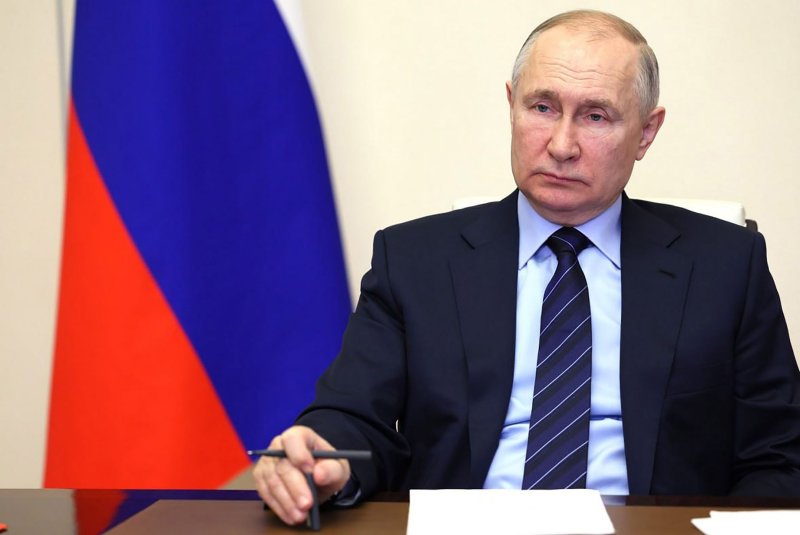1 of 2 | Russian President Vladimir Putin spoke about oil market stability Friday with Saudi Arabia's crown prince. Russia is party to OPEC+, the core members of the Organization of the Petroleum Exporting Countries and non-member state allies. Photo by Kremlin Pool/UPI |
License Photo
April 21 (UPI) -- Russian President Vladimir Putin said in a Friday conversation with the Saudi crown prince that collaboration with OPEC would ensure the global crude oil markets are relatively stable.
Russia is a party to OPEC+, the core group of member states plus non-member state allies. The group made a surprise announcement in early April to trim production by 1.6 million barrels per day starting next month.
Putin's office said Friday the president had a telephone conversation with Saudi Crown Prince Mohammed bin Salman, adding that Riyadh initiated the call.
"The parties discussed several key topics on the bilateral agenda, with an emphasis on further expanding mutually beneficial ties in trade, economic cooperation, investment and energy," a statement from Putin's office read. "They expressed satisfaction with the level of coordination at OPEC+ aimed at ensuring the global oil market stability."
The statement reflected reasoning from April 3 when OPEC announced the production decision. The cuts were taken as "a precautionary measure" meant to support stability in the oil market.
Crude oil prices were volatile over much of the first quarter and into April. The price for Brent crude oil, the global benchmark for the price of oil, traded as high as $88.19 per barrel in January and as low as $72.77 in mid-March.
OPEC's announcement in early April pushed Brent to $87.33 per barrel, though it was closer to $81 per barrel on Friday.
The "precautionary" was initially scoffed at given general economic resilience against higher inflation, though the mood has since soured. The International Monetary Fund expects global economic momentum to be the slowest in years, while housing and labor in the U.S. economy, the world's largest, is weakening.
Russian crude oil, meanwhile, is the target of Western-backed sanctions imposed in response to the invasion of Ukraine. A price cap on Russian crude, meanwhile, is meant to keep oil flowing from one of the world's largest producers, while at the same time limiting what goes into the Kremlin's war chest.
The International Energy Agency said in its monthly oil report for April, however, that Russian crude oil exports last month were the highest since April 2020, before the war.
"Estimated oil export revenues rebounded by $1 billion to $12.7 billion, but were 43% lower than a year ago," the IEA stated.
Gains from outside OPEC, meanwhile, won't be enough to offset the planned production declines and the EIA expects global crude oil supplies will decline by 400,000 bpd by the end of the year.















